How the poor are active contributors in sustaining community pantries
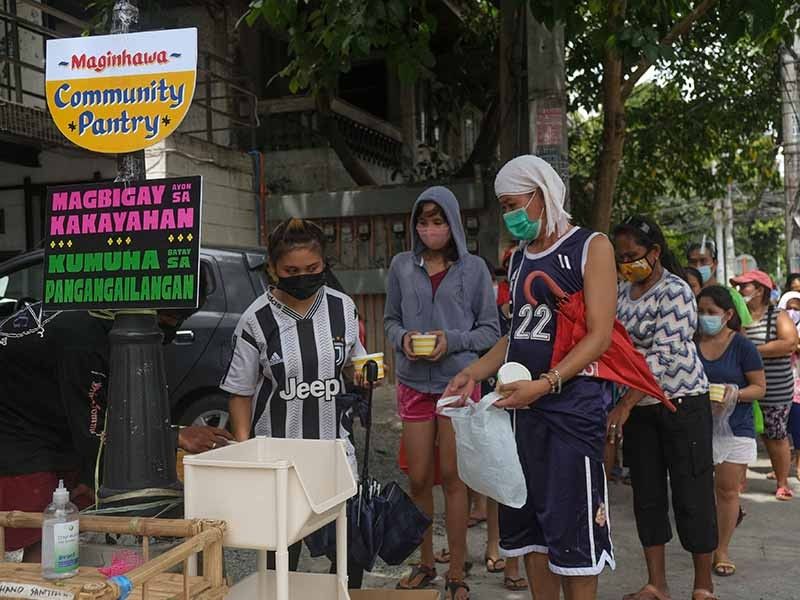
MANILA, Philippines — When urban poor residents from Area 17 in Barangay UP Campus, Quezon City heard of the community pantry, they immediately extended their help to Ana Patricia Non, whose viral post influenced other community pantries around the country.
The community remembers Non as one of the volunteers in Tulong Anakpawis Kitchen, where she previously volunteered to provide meals to families affected by unemployment during the early days of the 2020 lockdown.
"Our situation due to government neglect of the pandemic has worsened. We may not have the financial capacity to help, but we know that we can extend our skills and our time to assist the organizational needs of the pantry," Cristina Sabas, one of the volunteers, said in Filipino.
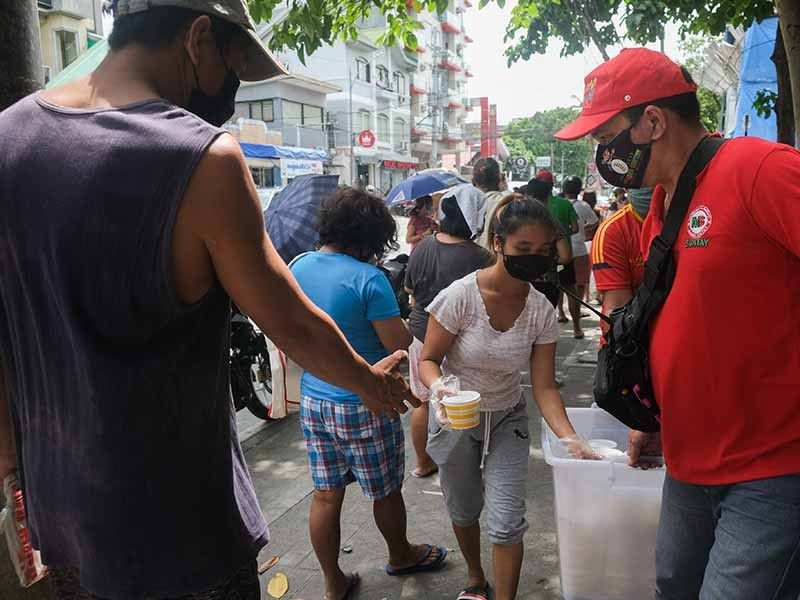
Aiza Revillo of Area 17 in Quezon City distributes porridge to people in line at the Maginhawa Community Pantry
Behind the viral pantries full of donated goods from the financially capable, is the priceless support from the poor, fundamental in keeping the growing community pantries afloat and organized.
"Stories on the community pantry focused so much on how it’s like an individual act alone, but in reality, I really cannot sustain it by myself, since it is community work," Non explained.
While distributing the porridge, the women observed that a number of people lining up for the pantry were also their neighbors at C.P. Garcia, a kilometer away from Maginhawa.
Noticing this, they had a different plan for the next day.
“Today, we’re here to volunteer from 8 a.m - 12 noon to repack goods, but at 2 p.m., we’re going back to our homes to start our own community pantry, so that people from our area need not walk and line up along Maginhawa, especially now since lines reach up to Philcoa,” said Aiza Revillo, another volunteer and resident of Area 17.
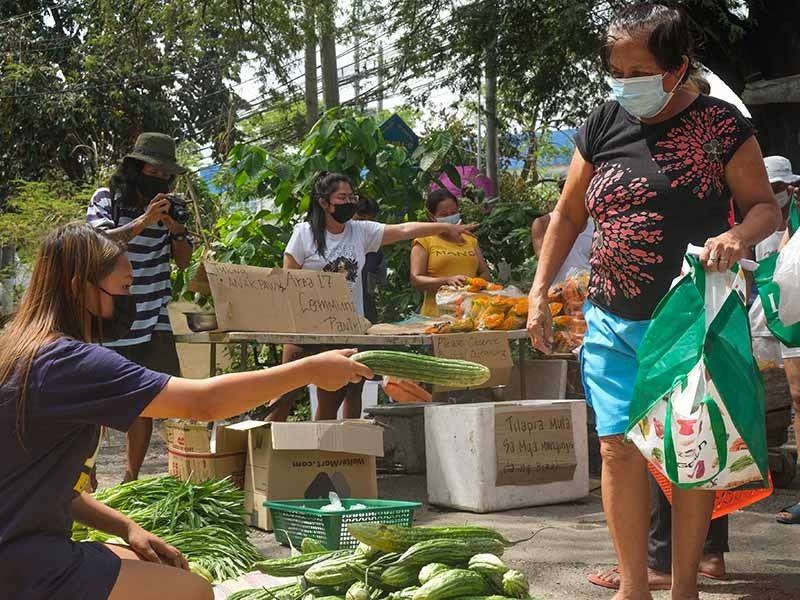
Area 17’s Community Pantry. Vegetables were donated by community farmers while tilapia were donated by fisherfolk from Rizal.
From her backyard, Maricel Paa, another resident of the community, harvested Chinese kangkong to put in their own pantry. She sells plants along C.P. Garcia, where she earns P 200 - P300 a day.
"I wasn’t able to work today because my time was spent in the pantries, but it’s okay for now, since what I was supposed to earn, which only goes to our food expenses, was provided in goods through the pantries," said Paa.
From being beneficiaries of the kitchen in 2020, the residents of Area 17 are now empowered to work as a community. They were able to organize their own pantry through support from similarly marginalized sectors of farmers and fisherfolk.
Workers Community Pantry
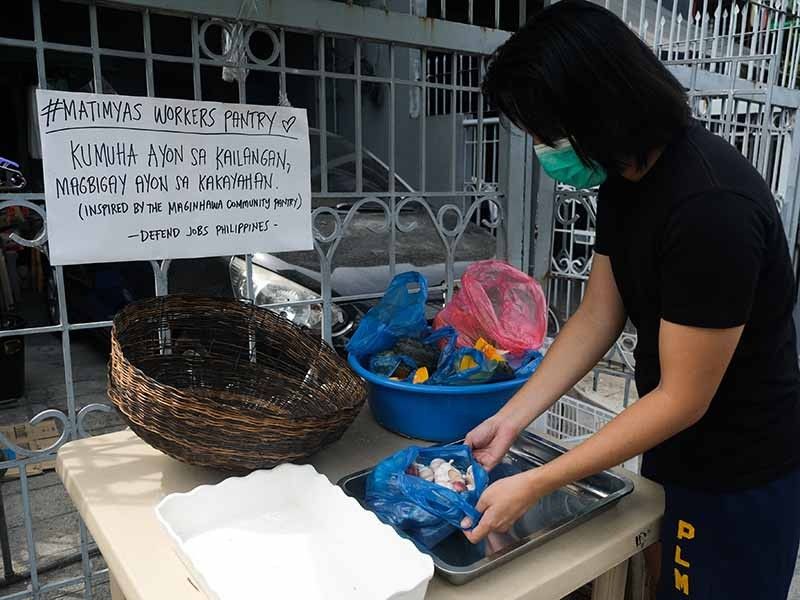
A member of Defend Jobs Philippines refills their community pantry from donated goods from their neighbor.
However, the situation isn’t the same for all pantries.
The pantry in Maginhawa, being the first, receives overflowing donations from various communities, but it’s also a reality for some pantries around the Metro to run out of goods quickly.
This is not out of a desire to put more than enough in their bags, or that people are less generous, but because there are more people in need than there are citizens financially capable of donating goods to supply all the pantries.
“We opened our pantry at 10 a.m., but the donated goods ran out at 10:30 a.m.,” said Christian Lloyd Magsoy, spokesperson of Defend Jobs Philippines.
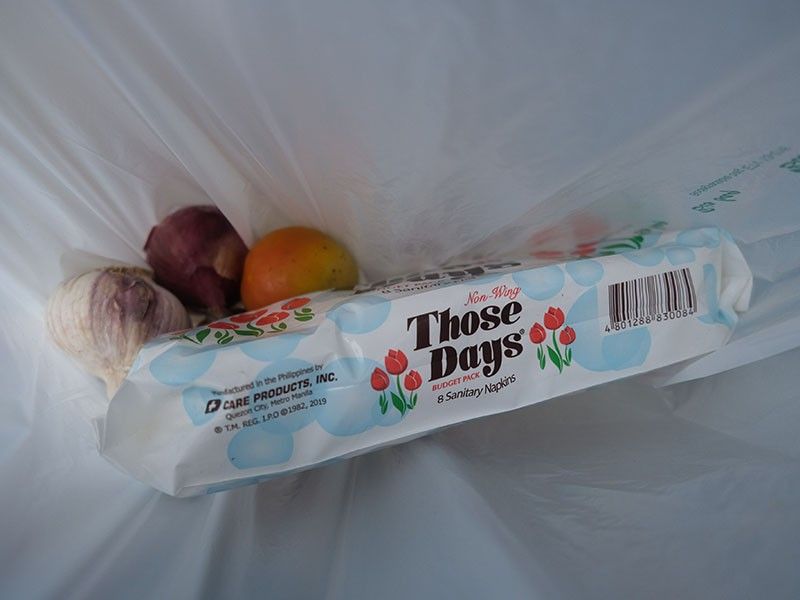
A housewife’s bag from a community pantry along Kalayaan. The woman said a pack of sanitary napkin, garlic, onions, and tomatoes are all she needs. She has a family of seven but said she did not fill her bag to leave items for others.
In their pantry in Sampaloc, Manila, people tried to get only as much as they needed, but with limited supplies to replenish it with, they also ran out during different times of the day.
Magsoy said that their pantry was initiated by workers from labor groups, however, these are also the same workers who were gravely affected by the job insecurity brought by the pandemic and lack of government assistance.
"Some of our donors donated as little as P2 on GCash, with a note saying that they really wanted to help, but their financial capabilities only allow them to shell out that much," said Magsoy.
Magsoy pointed out that pantries can provide immediate relief, but in the long run, the government should also craft laws that are pro-labor and pro-workers.
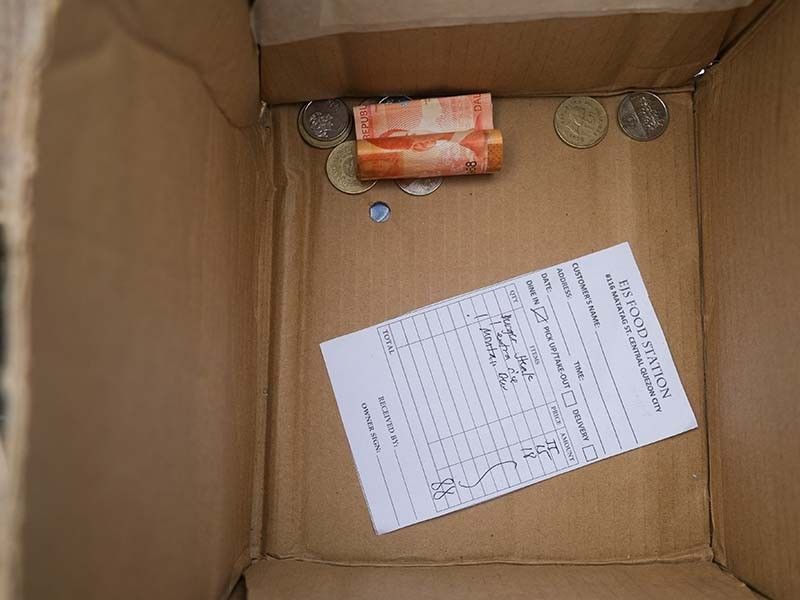
Urban poor residents along Kalayaan Avenue in Quezon City dropped monetary donations for their own pantry.
He said that the government could start by providing emergency wage relief of P100 a day to workers, but the government has rejected their petition.
Non, the initiator at Maginhawa, shares a similar opinion with Magsoy. “I was asked how I would feel if politicians adopt the idea, yes they could support it, but I also don’t really encourage it, since they’re already the ones with budget,” said Non.
“The government can control the livelihood, social services, and food security. So it’s also another question to ask, why would politicians rely on average citizens to keep on providing food for the people?"
"People can contribute their excess to the pantries, but the government has more money, they have our taxes, what the government can do is properly allocate it,” the 26-year-old woman added.
Bringing mutual aid to systemic change
For Nanoy Rafael, a community organizer at Save San Roque, community pantries have their merits in exposing the reality that people are hungry for a just and inclusive society.
Their organization consulted their community regarding the pantry, and residents at Save San Roque responded that they also witness the bayanihan spirit seen in pantries in their mundane and everyday interactions: asking neighbors for excess rice, cooking champorado and sharing to the neighborhood, or borrowing a small amount of money from each other to buy milk for their children.
"One step is sharing and bayanihan, but the next is a deeper sense of solidarity and organization. This can begin by providing spaces for the poor to listen to each other, for them to realize that they’re not alone in their struggle, and that through working together they are empowered to dismantle the oppressive systems they are in," Rafael said.
"Because while landlords own our lands, while the houses of the poor are being demolished to make spaces for malls and casinos, while large companies deprive workers of proper wages, the people will continue to go hungry," Rafael explained.
“And changing this is a step-by-step process: joining the farmers in asserting that the land they cultivate is theirs, allowing the poor to stay in the communities they developed, recognizing that factories cannot produce products if workers stop working. By joining the struggle of the poor and the oppressed, we can concretize the society we’re still dreaming of, evident through the rising community pantries,” Rafael added.
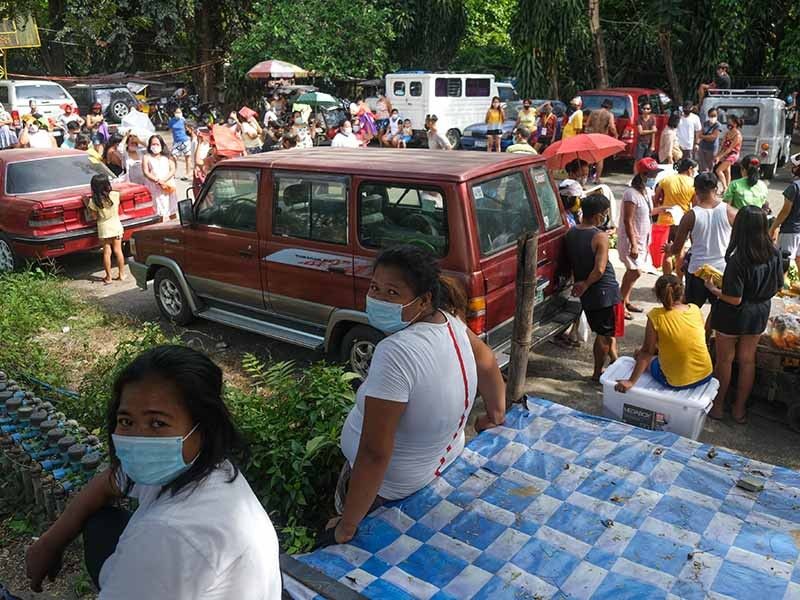
Maricel and Joy Paa of Area 17 rest under a tree after spending a whole day organizing two community pantries
Tomorrow, Paa, together with the community at Area 17, plans to get up early for the pantries again, not to line up but to assist in the pantry.
They will spend their mornings repacking the goods at the Maginhawa Community Pantry and their afternoons organizing their own.
They say they do it because the support they received from different communities last year and until now, empowers them to recognize their capabilities, now mobilizing them to extend themselves to similar marginalized sectors.
- Latest


























